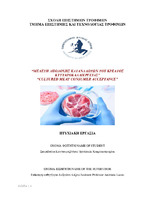| dc.contributor.advisor | Λάζου, Ανδριάνα | |
| dc.contributor.author | Κουγιουμουτζόγλου, Σπυριδούλα | |
| dc.date.accessioned | 2022-07-24T20:29:15Z | |
| dc.date.issued | 2022-07-13 | |
| dc.identifier.uri | https://polynoe.lib.uniwa.gr/xmlui/handle/11400/2628 | |
| dc.identifier.uri | http://dx.doi.org/10.26265/polynoe-2468 | |
| dc.description.abstract | Η αύξηση της κατανάλωσης κρέατος τείνει να κάνει τις κτηνοτροφικές μονάδες μη βιώσιμες στο
μέλλον. Επίσης έχει διαπιστωθεί ότι το κρέας λόγω των αντιβιοτικών και άλλως βλαβερών ουσιών
που περιέχει βλάπτει την ανθρώπινη υγεία. Γι’ αυτούς τους λόγους αλλά και για πολλούς άλλους
οι επιστήμονες οδηγήθηκαν στην εύρεση μίας νέας τεχνολογίας με στόχο το κρέας να
κατασκευάζεται σε εργαστήριο.
Σκοπός της παρούσας μελέτης είναι να ερευνηθεί κατά πόσο οι Έλληνες καταναλωτές θα
μπορούσαν να αποδεχτούν αυτή τη νέα τεχνολογία. Δηλαδή η στάση τους απέναντι στο κρέας
κυτταροκαλλιέργειας και η ενδεχόμενη πληρωμή του. Ακόμα στόχος αυτής της έρευνας είναι να
συγκριθεί με άλλες έρευνες που έχουν γίνει στην Ευρώπη.
Η μελέτη αυτή χωρίζεται σε τρία μέρη. Αρχικά δίνονται πληροφορίες για το κρέας
κυτταροκαλλιέργειας και την τεχνολογία παρασκευής τους. Το δεύτερο μέρος της εργασίας αφορά
την έρευνα και τα αποτελέσματα της και το τρίτο μέρος σχολιάζονται οι κυριότερες έρευνες που
αφορούν την αποδοχή του κρέατος κυτταροκαλλιέργειας από τους καταναλωτές.
Τα αποτελέσματα έδειξαν πως οι καταναλωτές δεν είναι διατεθειμένοι να πληρώσουν παραπάνω
για το κρέας κυτταροκαλλιέργειας από το συμβατικό κρέας. Επιπλέον, τα αποτελέσματα έδειξαν
ότι οι χορτοφάγοι δέχονται αυτό το προϊόν κυρίως ως μία άλλη λύση για αυτούς που
καταναλώνουν κρέας και όχι για δικής τους κατανάλωση, ενώ οι κρεατοφάγοι θεωρούν ότι το
κρέας κυτταροκαλλιέργειας δεν πρέπει να αντικαταστήσει το συνηθισμένο κρέας. | el |
| dc.format.extent | 78 | el |
| dc.publisher | Πανεπιστήμιο Δυτικής Αττικής | el |
| dc.rights | Αναφορά Δημιουργού - Μη Εμπορική Χρήση - Παρόμοια Διανομή 4.0 Διεθνές | * |
| dc.rights | Attribution-NonCommercial-NoDerivatives 4.0 Διεθνές | * |
| dc.rights.uri | http://creativecommons.org/licenses/by-nc-nd/4.0/ | * |
| dc.subject | Kρέας κυτταροκαλλιέργειας | el |
| dc.subject | Kαταναλωτής | el |
| dc.title | Cultured meat consumer acceptance | el |
| dc.title.alternative | Μελέτη αποδοχής καταναλωτών του κρέατος κυτταροκαλλιέργειας | el |
| dc.type | Πτυχιακή εργασία | el |
| dc.contributor.committee | Batrinou, Anthimia | |
| dc.contributor.committee | Kanellou, Anastasia | |
| dc.contributor.faculty | Σχολή Επιστημών Τροφίμων | el |
| dc.contributor.department | Τμήμα Επιστήμης και Τεχνολογίας Τροφίμων | el |
| dc.description.abstracttranslated | The increased meat consumption will make livestock units unsustainable in the future. It has also
been found that meat, due to antibiotics and other harmful substances that it contains, harms human
health. For these reasons scientists were led to find a new technology for meat to be manufactured
in a laboratory.
The aim of this study is to investigate whether Greek consumers could accept this new technology.
In other words, their attitude towards cell culture meat and its possible payment was studied. The
aim of this research is also to compare it with similar researches across Europe.
This study is divided into three parts. Firstly, information on cell culture meat and the technology
of its manufacture is given. The second part of the work relates to research of consumer behavior
and its results and the third part discuss other similar findings in the literature.
The results showed that consumers will not pay more for cell culture meat than conventional meat.
Moreover, the results showed that vegetarians accept this product mainly as another solution for
those who already consume meat and not for their own consumption, while meat eaters consider
that cell culture meat should not replace ordinary meat. | el |
| dcterms.embargoTerms | 6 months | el |
| dcterms.embargoLiftDate | 2023-01-23T20:29:15Z | |


